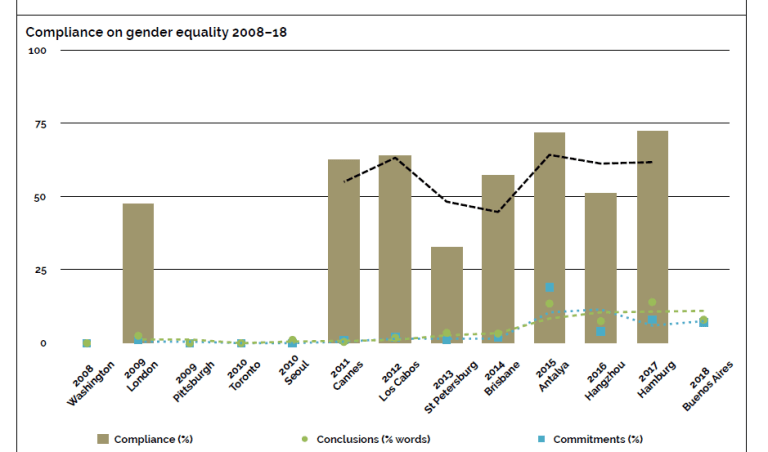Challenge
Proposal
The G20 has become a more significant player in governing global gender equality over the last five years. However, the expanding size and scope of its public deliberation on the issue has not yet translated into a significant number of action-oriented commitments to improve gender equality at home and abroad. Nor has the G20 produced high levels of compliance with its gender equality commitments. This raises doubts whether the G20 can get the real work done.
Conclusions
G20 leaders first addressed gender equality at the London Summit in 2009. Since the fifth summit in Seoul in 2010, their attention slowly increased in both size and scope. In London G20 leaders had dedicated just 155 words (2.5%) to gender equality. At Seoul they gave 177 words (1.1%). This dropped to the lowest point at the Cannes Summit in 2011 at 52 words (0.4%), but rose at Los Cabos in 2012 to 231 words (1.8%). It rose significantly at St Petersburg in 2013 to 1,015 words (3.5%).
At Brisbane in 2014 it dropped to 305 words (3.3%). Then came a sustained rise to 1,235 words (13.5%) at Antalya in 2015, 1,199 words (7.5%) at Hangzhou in 2016, and a spike to a record of 4,836 words (14%) at Hamburg in 2017. In Buenos Aires in 2018, it plunged to 676 words (8%), offering an opportunity for the 2019 Osaka Summit to restore the rise.
Commitments
This recent rise in G20 summit conclusions on gender equality did not extend to the number of commitments the leaders made.
From 2008 to 2018, G20 summits made 43 commitments on gender equality. The first two came at Los Cabos in 2012 and an additional four at Brisbane in 2014. Antalya in 2015 had none but produced four with gender as a component related to other goals. Hangzhou in 2016 had no core but eight gender equality-related ones. Standing out was the strong surge at the Hamburg Summit hosted by German chancellor Angela Merkel in 2017, with a record 30 core gender equality commitments and 14 related ones. However, at Buenos Aires in 2018 they dropped significantly with only one core commitment and seven related ones.

Compliance
G20 members’ compliance with these commitments has been low. The G20 Research Group has assessed seven core gender equality commitments and nine related ones for compliance. Compliance averaged 60%, much below the G20’s average of 71%. Core gender equality commitments averaged slightly higher compliance at 63% than the gender-related compliance of 56%.
Between 2008 and 2017, across all 16 assessed gender equality commitments, the highest complier was Canada at 81%. It was followed by Australia and Korea at 68%. The lowest compliers were South Africa at 34% and Mexico at 36%. Summit hosts for 2019 Japan and for 2020 Saudi Arabia have left room for improvement with averages of 49% and 61% respectively.
Causes
Higher G20 compliance on gender equality coincides with summits where more commitments on this subject were made. The summits with more commitments averaged compliance of 63% while those with fewer averaged 48%.
The number of catalysts, which are embedded in the commitment text and provide direction for implementation, in a commitment has little effect on compliance. Eight assessed commitments contained at least one catalyst. They averaged 59% compliance, compared to 57% for the other eight commitments that contained none.
However, specific catalysts seem to coincide with higher compliance. The two commitments with the highest compliance contained a reference to a specific target, a multi-year timeline, a past summit, a remit mandate and self-monitoring processes.
Corrections
At the Osaka Summit leaders should make many commitments on gender equality. They should pay close attention to the way that they structure their commitments. They should consider setting a specific target and multi-year timeline to achieve greater compliance success. This bodes well for the G20’s historic commitment at Brisbane in 2014 to reduce the labour force participation gap by 25% by 2025 – a commitment which contained both. They should also consider adding, for the first time, a transparent, self-reporting mechanism for this 25 by 25 commitment.
Furthermore, evidence suggests that holding G20 ministerial meetings on a specific subject both before and after the summit helps improve compliance.
There has yet to be a G20 meeting for ministers responsible for improving gender equality. This may partially explain the G20’s much lower on average compliance with gender commitments, compared to those on macroeconomic and financial regulation where G20 finance ministers have met frequently each year since the G20 summit’s start.
The views and opinions expressed in this article are those of the authors and do not necessarily reflect the views of the Global Solutions Initiative. This article was originally published in G20 Japan: The 2019 Osaka Summit by GT Media Group and the G20 Research Group, 2019. View the original article.








